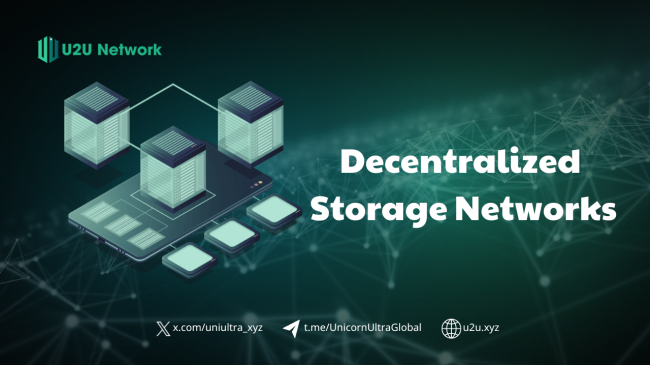In an age where data breaches and cyber attacks are becoming alarmingly common, traditional centralized storage models are showing their vulnerabilities. The susceptibility of storing large volumes of sensitive information in a single location has exposed businesses and individuals to significant risks. But what if there was a way to safeguard data in a safer, more flexible, and decentralized manner? Enter Decentralized Storage Networks (DSNs), a groundbreaking technology poised to revolutionize how we store and protect our digital assets.
What is a Decentralized Storage Network (DSN)?
A Decentralized Storage Network (DSN) is a distributed data storage system where information is not stored on a single central server but is instead fragmented, encrypted, and distributed across multiple computers (nodes) in a peer-to-peer network. This model stands in stark contrast to traditional centralized storage methods, where data is typically housed in a single location, often a data center.
Operating Principle
DSN operates by breaking down data into smaller fragments, encrypting them, and distributing them to various nodes within the network. Each node stores only a small portion of the data, and when users want to access the data, these fragments are assembled and decrypted.
Blockchain technology plays a crucial role in ensuring the immutability and transparency of DSN. Every transaction and data change is recorded on the blockchain, creating an immutable record of the data's history. This helps prevent unauthorized tampering, modification, or deletion of data.
Comparison with Centralized Storage
|
Feature |
Centralized Storage |
Decentralized Storage Network (DSN) |
|
Structure |
Single central server |
Multiple distributed nodes |
|
Security |
Vulnerable to attacks, single point of failure |
High security, data encrypted and distributed |
|
Transparency |
Low, dependent on provider |
High, transaction history recorded on blockchain |
|
Reliability |
Prone to data loss if server fails |
High reliability, data not lost if one node fails |
|
Cost |
High operating and maintenance costs |
Lower cost, saves on server expenses |
|
Privacy |
Dependent on provider |
Users have full control over their data |
As you can see, DSNs offer a superior data storage solution compared to traditional centralized models in terms of security, transparency, reliability, cost, and privacy. These advantages are driving the increasing adoption of DSNs across various industries, especially within the blockchain space.
Advantages of Decentralized Storage Network (DSN) in Data Security
Decentralized Storage Network (DSN) brings numerous superior advantages in data security compared to traditional centralized storage solutions:
- High Security: DSN employs robust encryption mechanisms to protect data. Information is not only encrypted but also fragmented (sharded) and distributed across multiple nodes in the network. This makes it extremely difficult for attackers to infiltrate and steal data, as they would need to breach multiple nodes and decrypt each shard of data.
- Transparency: All activities on DSN, including transaction history and data access rights, are recorded on the blockchain. Blockchain acts as a public distributed ledger that cannot be altered, ensuring transparency and user data control. Anyone can verify the authenticity of data and transaction history.
- High Reliability: DSN eliminates the single point of failure. Data is distributed across multiple nodes, so if one node fails, data remains intact on other nodes. This enhances system reliability and recovery capabilities.
- Cost-effectiveness: DSN utilizes idle resources of nodes in the network, significantly reducing operational and maintenance costs compared to maintaining a large centralized data center. Users can utilize excess storage space on their computers to earn additional income, while businesses can reduce data storage costs.
- Privacy: With DSN, users have full control over their data. Data is encrypted, and only the owner holds the decryption key. No third party, including DSN service providers, can access or control user data without their permission.
Challenges and Potential Development of Decentralized Storage Network (DSN)
Despite promising a future with better data security, a decentralized storage network (DSN) still faces several challenges that need to be addressed to fully leverage its potential.
Challenges
Scalability: As the amount of data stored on DSN increases, ensuring scalability and network performance becomes a significant challenge. Fragmenting and distributing data across multiple nodes can lead to latency issues during data retrieval. Solutions like sharding and efficient consensus algorithms are being researched to address this challenge.
Access Speed: Compared to centralized storage, data access speed on DSN may be slower due to data being distributed across multiple nodes and requiring time for aggregation and decryption. Solutions such as caching and network optimization are being developed to improve access speed.
Compatibility: DSN needs to be compatible with existing applications and systems to achieve widespread adoption. Integrating DSN with current technologies and protocols may be challenging due to architectural and operational differences.
Cost: While operational and maintenance costs of DSN may be lower than centralized storage, the initial cost to build and deploy a DSN network can be relatively high.
Potential Development
Despite these challenges, DSN holds strong potential for future development. With its superior advantages in security, transparency, and privacy, DSN is expected to find wide-ranging applications in various sectors, including:
- Finance: Securely storing transaction records, smart contracts, and customer data in a transparent and secure manner.
- Healthcare: Storing electronic health records, medical research data, ensuring data security, and privacy of sensitive information.
- Education: Storing educational materials, certificates, diplomas, creating a transparent and fair education system.
- Government: Storing public data, citizen records, ensuring transparency, and combating corruption.
- Business: Storing business data, contracts, customer information, protecting intellectual property.
Applications of Decentralized Storage Network (DSN) in Blockchain Data Security
Decentralized Storage Network (DSN) not only brings superior advantages in general data security but also holds significant applications in the realm of blockchain, enhancing the safety, transparency, and efficiency of decentralized systems.
Blockchain Data Storage
Blockchains often struggle with storing large volumes of unstructured data such as images, videos, or other large files. DSN provides an ideal solution to this challenge. For instance, in the realm of Non-Fungible Tokens (NFTs), DSN can be utilized to store digital art files, ensuring their authenticity, uniqueness, and immutability.
Secure dApp Development
Decentralized applications (dApps) typically require a secure and reliable storage system to protect user data and transaction information. DSN offers an ideal platform for building dApps, ensuring security, privacy, and censorship resistance. For example, a decentralized finance (DeFi) dApp can utilize DSN to securely store transaction information, smart contracts, and user data.
Decentralized Authentication and Identity
DSN can be employed to build decentralized authentication and identity systems, allowing users full control over their personal information. Instead of relying on centralized service providers, users can store their identity information on DSN and selectively share necessary details with specific applications or services.
The decentralized storage network (DSN) represents not just a technological advancement but a revolutionary shift in how we protect and manage data. With its superior advantages in security, transparency, privacy, and censorship resistance, DSN promises to reshape the future of data storage.
To fully unlock the potential of decentralized storage networks (DSN), concerted efforts from the tech community are essential to tackle current challenges and pioneer innovative solutions. Initiatives such as U2U Network, dedicated to building a robust Web3 ecosystem, play a pivotal role in advancing DSN through pioneering research and cutting-edge technology applications. This collaborative endeavor strives to create a future where data is securely safeguarded and individuals retain full control over their information.
Looking ahead, DSN will not only limit itself to storing blockchain data but will expand into various sectors including finance, healthcare, education, and governance. With ongoing technological advancements, we can envision a future where data is comprehensively protected, transparent, and decentralized, laying the foundation for a safer and more trustworthy digital society. The integration of DSN with advanced technological solutions, as pursued by initiatives like U2U Network, will be key to unlocking this future.





.png)
